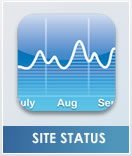|
The Internet has very rapidly become fundamental
to the global economy. More than 20% of the world's population, a
billion people worldwide, use it at work and socially. In little
more than 20 years it has grown from an experimental research
network to a system that now is the worldwide technological backbone
of new economic activities and infrastructures, supporting our
international economies, financial markets and health services,
energy, transport and defence systems.
The most common language used online is English. Over 430 million
people, equating to about 30% of all Internet users, use English as
their first language (L1). Whilst clearly a long way ahead of other
individual languages in terms of proportion of use, it would be
unwise to be too English-centric when considering ways and means of
communicating with web users. After all, the same statistic also
tells us that nearly 70% of Internet users don't have English as
their L1.
In second place to English is Mandarin Chinese with 20% of all
Internet penetration. The 276 million people currently using the
Internet in Chinese represent a rapidly accelerating 755% growth
between 2000 and 2008. With only one in five Mandarin speakers
currently using the Internet, many analysts consider it only a
matter of time before the Chinese language has a dominant online
presence; a presence that is predicted to offer endless new business
opportunities.
The third most commonly spoken language is Spanish, with 125 million
Spanish-speaking people using the Internet. This represents 6.8 % of
all the Internet users in the world. Out of the estimated 450
million Spanish speaking world population, only 27.6 % use the
Internet. The number of Spanish speaking Internet users has grown
405.3 % in the last eight years (2000-2008).
By far and away the most dramatic growth in Internet usage (as a
proportion of the total amount of worldwide L1 speakers of a
language) has been Arabic. Whilst having only 5.4% (60million) of
all Internet users, Arabic has experienced an explosion in growth of
over 2000% from 2000 to 2008. That is still only 16% of the total
number of Arabic speakers worldwide, with huge potential for
expansion.
The assertion often heard these days that English is 'the
international language' is true to the extent that English is
enjoying increasing coverage through international education
programs in schools and colleges around the world. English is
individually the most commonly used Internet language. David Graddol
in his fascinating and insightful report for the British Council
entitled 'The Future of English' estimates that there are now a
total of 750 million L1 (first or native language) plus L2 (second
or nth language) Internet users. What defining English as the only
really important Internet language fails to address is that while an
increasing number of people are now bi or multi-lingual, a majority
of the world's Internet users don't speak any English at all. Of
those that do, many would rather experience the Internet using their
L1.
As well as presenting language barriers to organisations and website
owners, the international diversity of Internet languages also
presents many opportunities.
For example, the online Spanish speaking market is growing
exponentially, currently boasting $500 billion in spending power.
That only 1% of English websites are currently translated into
Spanish means that there is huge scope for expansion into the
Spanish speaking markets. The same principle applies to most
non-English L1 markets. Local language combined with local knowledge
will prove to be an extremely powerful marketing tool.
The Internet is making economic activity more efficient, faster and
cheaper and is extending social, B2B and B2C interaction in
unparalleled ways. Increasingly, the largest productivity gains for
businesses come from using online networks in some form. For
example, UPS used multi-lingual online networks to optimise delivery
routes, saving 12 million litres of fuel in 2006 from a fleet of
nearly 100,000 trucks.
Making Multilingual SEO a part of your organisation's international
marketing strategy is critical for increasing exposure and sales
globally.
At SEO-MAMA we expertly apply our experience and abilities in
multilingual SEO and web marketing to effectively support our
clients with their international web presence. It's not just Google
that people use to search on internationally. We make sure our
clients get to the top of regional and local search engines wherever
they are - Baidu in China, NHN in South Korea, Yandex in Russia,
Voila in France, Netsprint in Poland and also the international
versions of Google.
We understand that proper representation isn't as simple as applying
a quick translation to existing sites. We give our clients and their
websites log lasting, robust and effective international coverage,
taking into account not just language but cultural nuances, context
and sensitivities. Insightfully translating a website into other
languages is just the first step in it becoming a part of the
international marketing campaign. For the site to enjoy profile and
traffic, Search Engine Optimisation needs to be applied expertly in
conjunction with all the usual on and Off Page Marketing techniques,
as well as managing multi lingual PPC campaigns.
Our multilingual expertise covers a range of services,
professionally integration multilingual web design and development
with SEO (search engine optimisation), Online PR and pay-per-click
campaigns. We apply the same professional tasks to a foreign
language site as we would to an English language site - be it in
French, German, Spanish, Mandarin Chinese, Italian, Dutch, Japanese,
Korean, Arabic, Russian or any of the other languages we specialise
in.
We identify business objectives and begin with a definition of
semantic space - the foundation of any SEO campaign. Appropriate
local terms bring appropriate L1 visitors, which are likely to
convert into leads, customers and ROI.
Search engine preparation: we apply clean, current standard
compliant HTML code to develop sites that foreign language search
engines can easily read and add to their indexes. We develop a high
ratio of L1 content to code and a fast-loading, accessible search
engine friendly structure. Close attention is paid to core
web-programming principles.
Content and structure: search engines like text content. But what
they absolutely love most is relevant search returns. Each page on
the site should contain high quality, Local Language Content and use
structural elements (heading, paragraph and other HTML tags) to
indicate importance to the search engines. All in context and all
applied appropriately.
Link popularity: Link Analysis is a critical part of search engine's
ranking algorithm. We develop local language incoming links from
other relevant sites as part of our multilingual link building
Search Engine Optimisation.
|



















